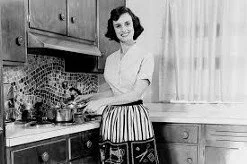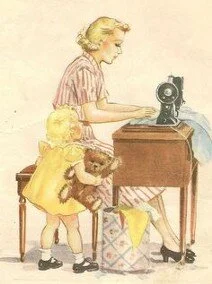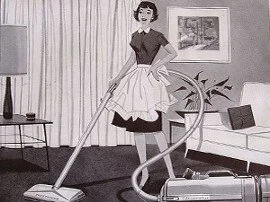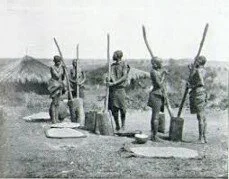Pretty Birds in Pretty Cages: Could the Nuclear Family Be the Reason We’re All Lonely?
I’ll never forget the day I first fell apart. It was just after I left my job as a software engineer to stay home and raise my children. Those first months are a blur, but one day still lives in my mind as if it happened yesterday.
I’d taken the boys out for a walk in a double stroller. The toddler was strangely silent as we walked and eventually the baby fell asleep. I walked the neighborhood as I had many times before, but this time I noticed it…the silence. I lived in one of those cookie cutter suburbs of Chicago, row upon row upon row upon row of houses, all the same but with different siding. Everywhere I turned there were homes, but not a single person could be seen.
I walked down every street that day, continuing as the silence began to grow larger within me, becoming a discomfort without a name. The streets were empty. No old folks. No cars driving by. No children playing in yards. No other parents walking their children. I strolled past not one, but two empty parks. I began to panic. Where were the people? Was I the only one alive?
Suddenly, I stopped on the street corner and screamed at the top of my lungs. I paused to look around.
Not a single person so much as peeked out their window to see what was going on.
So I continued to scream until the toddler stood up in the stroller and looked at me, wide eyed. I saw the fear and concern on his face and began to cry.
In that sea of houses, I was completely and utterly alone.
Recently, I was following a thread on Facebook in which several men were debating the reasons for why it seems that men and women are drifting apart. From the rising divorce rate as well as the delay in marriage and family in the younger generation, it seems that we no longer want to pair up. I’ve often wondered why this might be. Is it that marriage as we know it is old-fashioned? Yet how could it be, when we’ve always coupled up to mate? It takes two to tango, right? Perhaps it’s because we’re all so busy we no longer find sex appealing? Has it become another chore in the endless list after work, children and housework? Maybe if men just helped out around the house, we could figure this out?
It’s probably all of those reasons, but as I read the thread I thought back to that day on the street corner and I began to wonder at the issue that seemed to be behind much of the strife between men and women these days— raising children is really hard, really lonely, and many women really don’t want to do it anymore.
It could be an evolutionary trend. Now that the human race is stable, we don’t need so many babies and as a result women don’t crave sex the way we once did. Or maybe we don’t crave motherhood like we once did? Two kids and most of us are out. Many more are opting out completely. In addition, when you add work to the equation, every kid exponentially increases the stress level. This leads to the question, why would mothers flock to the workforce when there’s so much to do at home? I know that in today’s economy many of us must, but when my mom was a young mother women took on jobs for a different reason — they entered the workforce to be a part of the economic community.
In 1963, Betty Friedan published The Feminine Mystique, where she addressed, “…the problem that has no name.” Essentially, the loneliness that so many housewives in the 50’s and 60’s suffered from. She argued that women’s education and literature worked to force women into this role where they spent most of their days alone in the home, keeping it beautiful to the detriment of their own identities.
As I walked down that suburban street in 2001, fifty years after the advent of the modern housewife, I also felt that way. The truth was, as much as my sons needed me, the price to raise them was high. In order to be with them, I had to be present in the home where they ate, slept and played. To do that, I had to leave my engineering community and live alone in what was essentially a box — four walls with no other adult interaction. In that place I became a pretty bird in a pretty cage, and it almost destroyed me.
According to Betty Friedan’s work, the role of housewife has destroyed many. Today, women have left the confines of the cage, sending their kids off to daycare or other people’s homes, in order to “have it all.” But what exactly does that mean? Do we really want to slave away forty hours a week at a paid job while someone else raises our kids, only to rush from work at the end of the day to get said kids before daycare closes, drive them around to their various activities, then rush home to cook a meal, do homework, bathe them, get them to bed and only then start the laundry and pay the bills?
What the hell is this? It’s no wonder women see mothering as a chore and sex even more so.
Yet I’ve come to believe that it’s not the parenting that we wish to avoid, it’s the loneliness and isolation of the nuclear family in the modern world that is making us miserable. As a species, we’ve been making babies for a long time, but the nuclear family wrapped up in the pretty little box of home ownership is relatively new. The nuclear family is defined as two parents and their children living in their own single-family household. This assumes no grandparents, aunts, uncles, cousins, essentially no other adults but the two parents. It also means that in order to own said house, at least one of those parents must work outside of the home, thus leaving the parenting to the other partner.
Ideally we should be splitting that parenting, but research shows that isn’t happening. According to Time magazine, even in households where women work the same number of hours out of the house as their husbands, on an average day, 19 percent of men did housework–such as cleaning or doing laundry–compared with 49 percent of women.
The solution thus far has been to suggest men to step up, or even be stay at home dads, and more men do take that role now. However, as a recent article in the Guardian on the Masculine Mystique points out, men are also lonely and suffer in the lead parenting role. Moreover, one of the leading causes of death among men between ages 35–55 is suicide, and the rate is highest for men who are unemployed.
Some have said that this is proof that men would rather die than do “women’s work” but in the 50’s and 60’s women weren’t much better off, using Valium and liquor to soothe their lonely souls.
What if the reason for all of these issues — from disinterest in sex to the frenzied pace of modern life to the desire to divorce or put off marriage — have nothing to do with men and women and more to do with the fact that when we left our tribes, villages and communities to pursue the industrial dream, we cut ourselves off from the one thing we need to be happy — each other?
Consider these images of communal life vs. the perfect modern life that began to be sold in earnest to the American public just after WWII:
In each of the modern pictures, the woman is alone. In the others, they are in groups. We praise the modern ones as being worthy of our intellect, and often we look at pictures of those living in community as less than. For sure, technology has made housework easier and those still living in rural or tribal communities are much less wealthy than modern, industrial ones. They struggle and spend most of their days working just to keep a roof over their heads and food in their bellies.
Yet, it appears, so do we. And we’ve made the raising of our children incredibly isolating in the process.
The nuclear family is a recent human development. Some argue it’s been around since the 13th century in England, but the term was first used in America in 1949. Even if it was invented in England in the 1200’s, our race has spent millennia raising our children and working together rather than isolated in singular pods. In addition, most of the world actually still lives in either village situations or extended families, where grandparents also live with the family, who often help with the care of the children as well as provide an adult company.
The nuclear family has allowed the first world to grow our economies in many ways, and give more of our attention to fewer children. Yet it has also isolated us, creating situations where many adults are lonely. Whether stay-at-home parents, single moms and dads, or even the elderly in nursing homes, we have paid a price for the pretty little cages we call home.
I don’t think mating has gone out of style. Nor has sex or even having children. We long to be together. Yet we long for more than just that one perfect mate — we need to be a part of something bigger to feel happy and alive. We need community and a variety of ages and friends. No one person can be everything to us. And just as children need one another to play, we adults also need to enjoy time together. In the industrialized world, the community has moved from where we live to the office or work space and away from our homes and children. We’ve been split apart and if you wish to be a parent, you will always feel that split. At home you’re missing other adults and at work you’re missing your kids.
And regardless, your mate must take the place of all those other humans we once knew as our neighbors. That seems like a mighty big ideal.
The longing to be with others isn’t a feminine mystique and it isn’t a masculine mystique. It’s the human mystique.
Author’s note: In response to the initial loneliness of my parenting experience I did two things that I highly suggest. First, I sought help with a therapist. Second, I found a parent-child group. The women and teachers that I met during that experience became my community. Then, as my children aged I sought out new forms of community by volunteering at their school and eventually going to work part-time. I also invest in friendships, both male and female.





